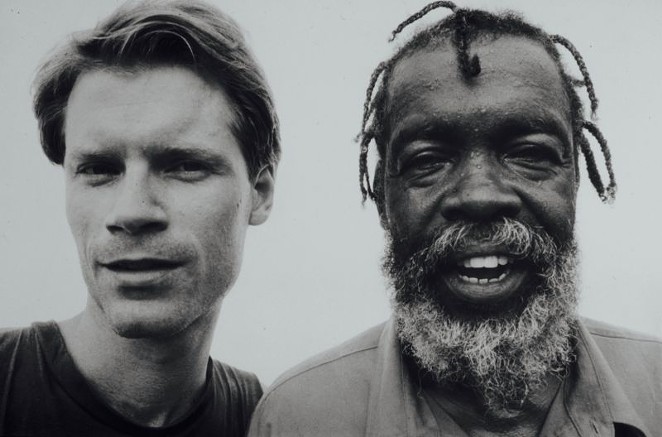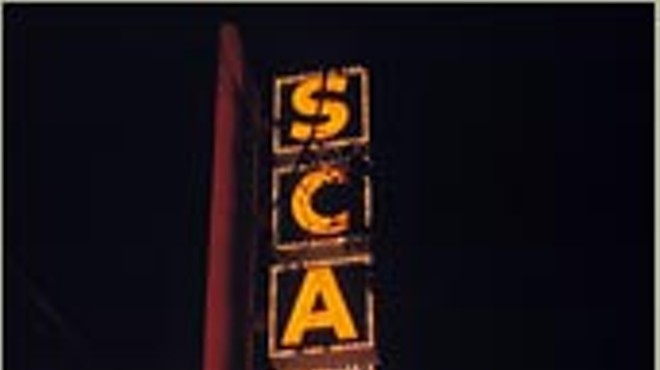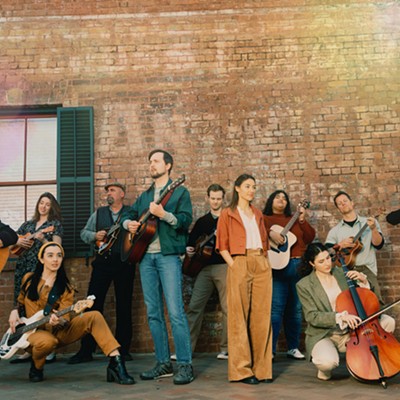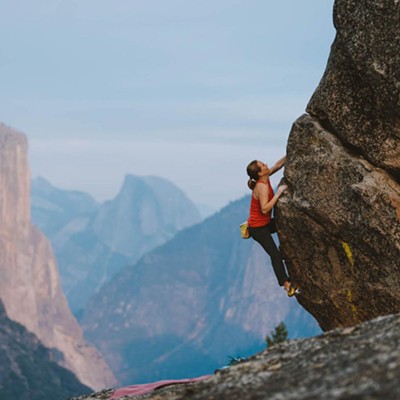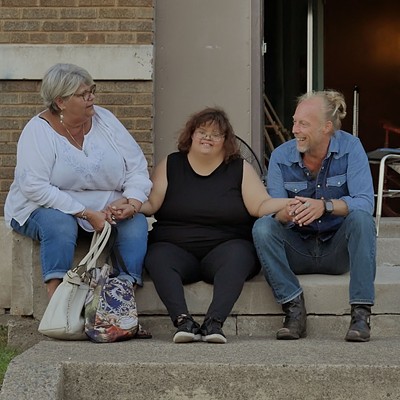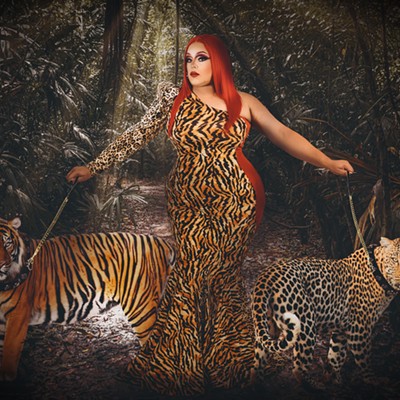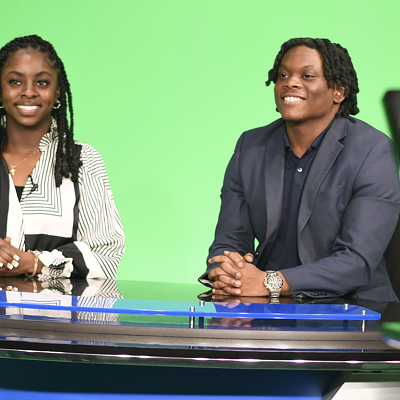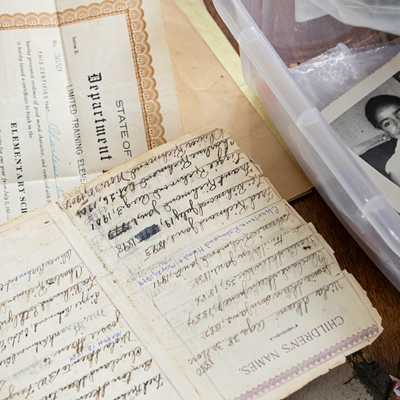V. SCOTT BALCEREK'S buzzed-about documentary Satan and Adam tells a story that's been 23 years in the making. The film centers around Sterling "Mr. Satan" McGee and Adam Gussow, a duo that met playing blues together on the streets of Harlem in the 1980s. McGee was a black former session musician and Gussow was a much younger aspiring harmonica player, and the two struck up a musical connection amid racial tensions brewing in Harlem at the time.
Thanks to word of mouth, and a little help from an appearance in U2’s concert documentary Rattle & Hum, the pair were courted by record labels and producers and ended up achieving considerable critical success and taking their act on the road internationally for many years. The path turned dark along the way, and Balcerek was there to document it the entire time.
Ahead of the film’s screening at the upcoming Mountainfilm Festival, we spoke to Balcerek about the moving story and what the film means to him.
I just finished watching the movie and I’m still kind of reeling from the whole thing. Truly and honestly, you did an incredible job.
VSB: Thank you!
It's an amazing story and there's so much to unpack, but I'm curious – before you started working on this, what was your affiliation with Satan and Adam? Were you a fan?
VSB: Well, I'm a musician so that's the first thing. I have a lot of friends who are musicians, and at the time I was wanting to get into film. I was super young, and my friend had mentioned this band were playing and that I should go and see them play. This was in Pittsburgh, Pennsylvania, where I'm from. This was like 1992 or something. At the time I was also editing a film for a friend of mine that ended up winning the Student Academy Award, and it was about a street singer in Pittsburgh.
When my friend invited me out, they were like, “You should go. Not only are you a musician, but they’re street musicians as well and it’s sort of like this film you’ve been editing.” That’s how I got involved with them. I went and was completely blown away – not only by the sound that they made, but it was such a disparate act. They were from completely different sides of the tracks, as they say. It just didn’t make sense, but the interesting thing was that you could close your eyes and it’d sound like a full band. But then you’d open your eyes and it was just two people. The music was amazing, but visually it sort of made no sense [laughs].
Right! Totally.
VSB: It was almost absurd on some level. Also, Satan as a guitarist, I saw him as an unsung hero of the guitar world. I just felt like he should get more attention. The only thing I was thinking was, in sort of a pithy state I thought that maybe the film should be told as an allegory for American music. The black and white, the font of wisdom from the blues world that inspired rock and jazz and all these other offshoots of American music and is a combination of these two races. That's not really what the film became, but maybe some people could look at it as that pithy idea I had in 1992. Hopefully that's one way to read the film.
I was going to ask, because there's so many sides of the whole thing, about where this started off and what it ended up being. Was there a moment during the process where you found a layer to the story you weren't aware of that expanded the scope?
VSB: Oh yeah. I mean, I expected to follow to them and tell the story of their rise off the street to this wider international acclaim. I thought that they could just get bigger and bigger and bigger. Not only is it great music but there's a great story here. Two people from completely different sides of the world meet on the streets of Harlem in the 80s when it was super dangerous and they become this thing.
Of course, that’s not what happened. I think that in the downturn of what happened to Sterling, you see that music can mean and should mean much more to people who play it. Adam built a cross-cultural relationship with someone through music and it impacted his life in a grand way. So the film became about, how do we break these societal barriers that keep us apart? Not only with social media but also with Trump. We’re slowly being divided by technology, and this is a story that rises above that.
You meet a person and you take the risk of that relationship – whether it’s getting beat up on the streets of Harlem or having to deal with the elderly sick person that you stand by. You build these enduring relationships and that’s what really matters in the end. So I was happy that the relationship rose above all the things that constrain us.
Did you have any idea that this would be something you’d be working on for 23 years? Or did you think, “This will be something I’ll do for a few years and sort of follow this journey”?
VSB: I'd heard that most docs take an average of three to four years to make, so I was thinking about that [laughs].
One part of this story in particular hit close to home for me. As things start to get bigger with the band, Sterling starts to get a bit uncomfortable with the whole thing – especially having come from that too. He sort of had his spot in Harlem where he was comfortable and then was thrust into the spotlight more. And the rigors of touring the way he did really started to get to him.
VSB: That was a big deal for me. I toured in bands, not even at their level, and we'd only go out for a month at a time and come back. But those guys were out all the time and had these commitments. When we toured, it was super punk rock. Sleeping in shitty places, the whole band in one hotel room – crazy stuff. This guy was kind of doing that, living in his car and stuff like that, but he was going on 60. And he kept doing it. He did it because he was making more money, but as Adam says in the movie he did it for Adam too.
Adam really wanted it, and Sterling was willing to go back into that world. He was doing it for his friend. But it came at a cost.
Do you think that he always felt uncomfortable with that life? Deep down, would he have always preferred to end up doing what he was most comfortable doing? Do you think a career was his goal?
VSB: No, his goal was to play for his friends on the street and give his money away and live a simple life. He was always like that, even when I was hanging out with him. Even in the nursing home, he would play once in a while and he'd come home and give his money away. He's sort of a rare entity. It was never about making it or getting big. He was too much of a philosopher type of person to do that. He cares a lot. He's a good loving sort of guy.
If there's one thing you hope people would take from this film, what would it be?
VSB: If you let it, music and culture and art is something that binds us together. [Especially] in a time when we're being separated by technology and by our current government. I know it sounds sort of large and pithy, but these are the things I think about. People don't really interact as much because of technology, and I hope that people take away the fact that in order to get anything, there has to be some sort of risk to it.
The best things require those sort of unknown steps that you take. You desire something or some sort of connection, but that’s not something you can do all the time from the safety of behind your computer or behind a vapid ideology. You have to engage and give to the world in order to get something back. Adam took a risk and went [to Harlem], and Sterling took a risk too. People would say, “What are you doing playing with that white boy?” and a couple people threatened him. He stuck with it. It’s a small act, but the film shows that being courageous in that way is something that Adam has taken throughout his life.
He’s a professor now almost because of his relationship with Sterling. It’s impacted his life in a big way, and there’s no doubt when you watch the movie that you see that. I hope that’s what people take away.

